Worship-Additional
services
Please visit the buttons below for details on Daily and Shabbat services, service times, our livestream and Zoom links, etc., and scroll down for information on our holiday observances and celebrations.
Sukkot & Simchat torah

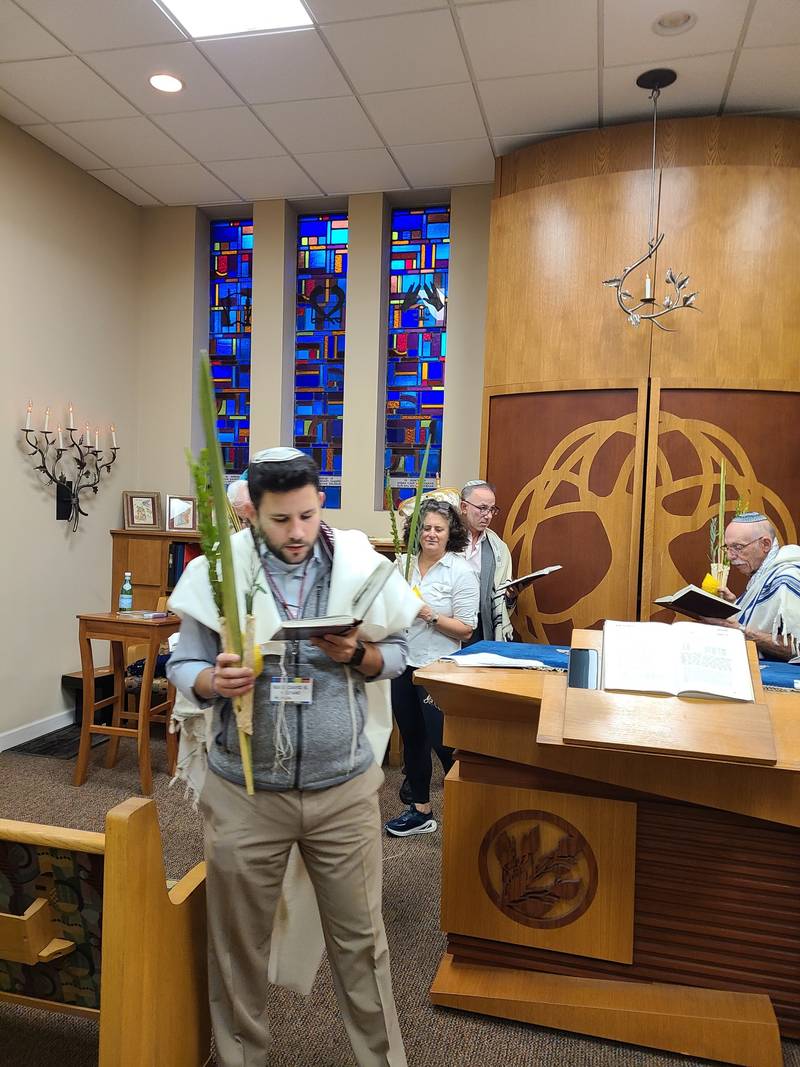
The fragile huts that are the center of the Sukkot festival are our symbolic homes for seven days reminiscent of the years our ancestors spent wandering in the desert. Exposed enough to the elements to remind us of our dependence on divine providence, we eat and perhaps sleep in a sukkah, and shake the arba minem (four species): lulav (palm), hadas (myrtle), arava (willow) and etrog (citron), symbolic of parts of our bodies, celebrating the good fortune of the fall harvest.
Reluctant to end the festival, we add an eighth day, Shemini Atzeret, that creates a break before returning to the work-a-day routine world. Shemini Atzeret includes yizkor prayers for the departed and the geshem prayers for rain. The day is followed by the conclusion and immediate beginning of the annual cycle of Torah reading on Simchat Torah, filled with song and dance and special honors for two congregants called to the last and first aliyot of the cycle, the Hatan (groom) or Kallah (bride) of the Torah and of Bereishit (Genesis).
Sukkot, Shemini Atzeret & Simchat Torah 5785 - Schedule & Programs
cHANUKAH

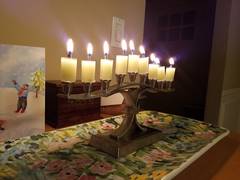
The festival of lights celebrates the rededication of the holy Temple in Jerusalem in the Second Century B.C.E. following the Maccabean revolt against the Seleucids (Syrian-Greeks). We light the hannukiah, an 8-branched menorah commemorating the miracle that a small flask of oil burned for eight days at the rededication until fresh oil could be sanctified, and enjoy foods fried in oil, especially latkes (potato pancakes), and sufganiyot (jelly donuts).
worship details:
Throughout the holiday, a brief prayer called Al Hanisim (“on miracles”), which details the story of Hanukkah, is added to the silent Amidah and its repetition as well as grace after meals.
service times:
Service times and daily minyan are not affected during Hanukkah.
Purim

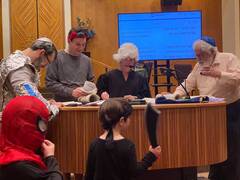
The celebratory memory of the triumph of Mordechai, Esther and the Jews against the conspiracy of Hamam in the Persian royal court in the Fourth Century B.C.E. includes dressing in costume, giving of gifts of food, reading of the Book of Esther, eating of tri-cornered hamantashen cakes, and general merriment. The satirical Purim Shpiel play, near to the holiday in time, is a treasured Shearith Israel tradition.
pesach (passover)

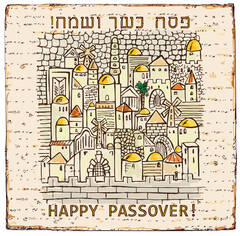
The best-known and most-widely celebrated of the Hebrew festivals, Pesach commemorates the Exodus from Egypt in approximately the 13th Century B.C.E. ending a long period of enslavement. We cleanse our homes of chametz (leavened grain products) in anticipation of the 8-day holiday, and join family and friends in a festive meal of symbolic foods, during which the story of the Exodus is retold, it’s message of freedom explored, and favorite melodies are sung late into the night. Yizkor prayers for the departed are recited on the seventh day of the festival.
SHAVUOT

A harvest festival in ancient Palestine, the two-day Shavuot holiday begins 49 omer days after the start of Pesach and is celebrated as the anniversary of the receiving of the Torah at Sinai with (for some: all-night) learning. As the Israelites refrained from eating meat in the days prior to receiving the law, we favor dairy foods on Shavuot. As if at Sinai, we stand in synagogue when the Aseret ha’Dibrot (Ten Statements or Commandments) are read aloud; Yizkor prayers are recited on the second day of the festival.
Shavuot 5785 will be observed Sunday night, June 1st - Tuesday night, June 3rd, 2025. Yizkor will be recited during Yom Tov morning services on Tuesday, June 3rd at approximately 11 am.
We look forward to learning from Shearith Israelites and the greater Atlanta Jewish community members on topics related to the evening's theme. The program will include a panel discussion moderated by Samara Minkin, Executive Director, The Spring, featuring Dov Wilker, Regional Director, AJC Atlanta/Southeast and Eytan Davidson, Regional Director, ADL, and Emily Kaiman, Deputy Director of Jewish Communal Engagement, J Street; Deputy Director J Street Georgia, as well as moderated text study, break-out learning sessions with teen leaders, Paul Root Wolpe, Marshall Duke, and Ori Salzberg, and a closing session facilitated by Rabbi Kaiman, Rabbi David, and Ori Salzberg.
Learn more and register for Shavuot Dinner and our Tikkun Leyl Shavuot night of learning on the theme "Visions of the Jewish Future" via the button below.
Tue, December 2 2025
12 Kislev 5786
Today's Calendar
: 7:00am |
: 7:00pm |
Upcoming Programs & Events
Dec 3 |
Dec 3 |
Dec 4 |
Dec 5 |
Dec 7 |
This week's Torah portion is Parshat Vayishlach
| Shabbat, Dec 6 |
Candle Lighting
| Friday, Dec 5, 5:11pm |
Havdalah
| Motzei Shabbat, Dec 6, 5:59pm |
Shabbat Mevarchim
| Shabbat, Dec 13 |
capital campaign

Our community is bursting at the seams! It’s time to shape our synagogue’s future together.
president's corner
Read the latest update from our President, Jeff Kirsh, on the work of our staff, current projects, and community programming.
in this moment
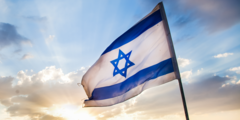
We are committed to caring for each other, advocating for the Jewish people and Israel, and recognizing the challenge of this moment of crisis and tragedy. Learn how we are responding to the situation in Israel.
ALT SERVICE
Join us for our weekly ALT Service (for all-ages) with CSI Spiritual Music Innovator Ori Salzberg on Shabbat mornings at 10:30 am!
stories@csi
bylaws
the United synagogue of conservative judaism

Shearith Israel is affiliated with USCJ, a network of thriving centers of Jewish practice across North America, Israel, and beyond that celebrate both tradition and contemporary life.
CONGREGATION SHEARITH ISRAEL
1180 University Dr NE • Atlanta, GA 30306
Telephone: 404-873-1743 • Contact Us
Members are invited to join the CSI Member Exchange on Facebook here!
Privacy Settings | Privacy Policy | Member Terms
©2025 All rights reserved. Find out more about ShulCloud




